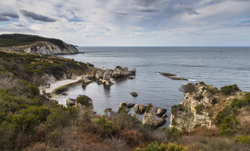EU–Black Sea cooperation in full swing
Bridging the Caspian region with the Balkans and the Middle East with north-east Europe, the Black Sea region is a very strategic one for promoting exchanges in science and technology (S & T). In the past two decades, the Black Sea Economic Cooperation (BSEC) organisation brought together 12 EU Member States and nearby nations, including Albania, Armenia, Georgia, Moldova, Russia, Serbia, Turkey and Ukraine. It enabled the countries to work together in S & T research, encouraging coordination between national and regional research programmes targeting the Black Sea region and strengthening joint projects with the EU. Against this backdrop, the EU-funded project 'Networking on science and technology in the Black Sea region' (BS-ERA.NET) worked on integrating the Black Sea region into the European Research Area (ERA). It reduced fragmentation of the ERA, upgraded synergy among intergovernmental structures, and added value to current S & T partnerships in the region. The project's main goal was to articulate the Black Sea Research Programme (BSRP) in a context of transnational cooperation. To achieve its aims, the project promoted information exchange on national and multilateral projects in the region, promoting transparency and identifying good practices for cooperation and joint funding. It outlined common strategic activities between coordinated research and development programmes, defining all aspects of the BSRP and launching a pilot joint call for proposals for funded EU-led projects. The call, which was the project's main outcome and which closed in January 2011, focused on the environmental and energy fields, looking at new strategies to develop solutions for sustainable development. More specifically, the environment part looked at exploitation and transport of mineral resources, including environmental impacts, as well as waste pollution prevention options for coastal zones and tourist areas. In parallel, the energy part of the project covered hydrogen production from H2S-rich Black Sea water, as well as carbon dioxide capture and storage technologies for zero-emission power generation. Overall, from the 66 projects submitted, of which 56 were eligible, 11 projects were finally selected and funded. This furthered S & T cooperation between EU Member States and Black Sea countries, advancing the concept of joint funding for transnational projects and initiatives. Currently, the BSRP is continuing to support joint research projects, promote capacity building, encourage mobility of researchers, drive innovation and reinforce research infrastructures. Its activities include monitoring, foresight, outreach and dissemination, presenting an excellent example of best practices in the research field for the region. The momentum created by BS-ERA.NET is expected to lead to future calls for funded projects. This will lay the groundwork for more joint initiatives to further scientific, technological and environmental cooperation.



